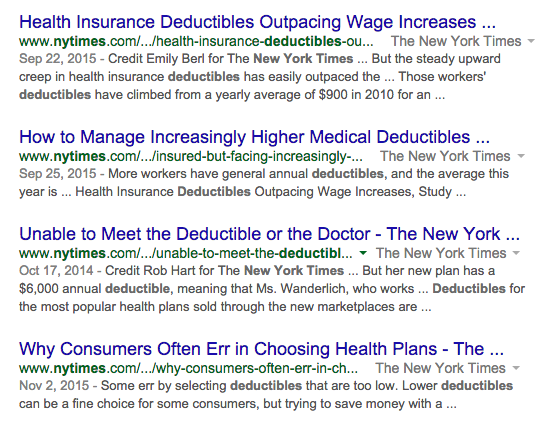The Deductibles Are Too Damn High

The Times reported this weekend that deductibles for many Obamacare health care plans have moved from Alarming to Off-Putting, to the degree that some are forgoing insurance altogether rather than deal with the numbers.
for many consumers, the sticker shock is coming not on the front end, when they purchase the plans, but on the back end when they get sick: sky-high deductibles that are leaving some newly insured feeling nearly as vulnerable as they were before they had coverage.
“The deductible, $3,000 a year, makes it impossible to actually go to the doctor,” said David R. Reines, 60, of Jefferson Township, N.J., a former hardware salesman with chronic knee pain. “We have insurance, but can’t afford to use it.”
In many states, more than half the plans offered for sale through HealthCare.gov, the federal online marketplace, have a deductible of $3,000 or more, a New York Times review has found.
Count mine among them, and Nicole’s! Here’s how Nicole put her options earlier this fall:
I’m paying $2,948.28 over the course of the year for the privilege of only having to pay $6,100 towards any medical costs.
Would this look as bad if it wasn’t more expensive than the 2015 plan? I don’t know. With health insurance, I have no real concept of what is “good” or “bad” anymore. Health insurance works for me because I have the luck of being healthy. Were that to change, my provider would expect me to spend $9,048.28 — roughly 18 percent of my estimated post-tax income — on healthcare.
My Bronze plan, for which I pay $352 a month, comes with a $3000 deductible, after which I’m responsible for 50% of all costs until I hit my $6,000-some ceiling for the year. Mine is basically the cheapest decent plan I could find and I can afford it only because I’m married to an employed person and we have savings. Many Americans aren’t so lucky. (Although many Americans do qualify, thank goodness, for subsidies.)
In not mentioning HSAs, or health savings accounts, though, the Times article is remiss. As we’ve covered in detail on the site, the silver lining to a high-deductible Bronze plan is an HSA, which allows you to save, invest, and spend tax-free dollars on medical bills as well as other medical expenses like acupuncture. Vanguard calls HSAs “triple tax-advantaged.”
The Times write-up is also a bit peculiar in other ways. Like many trend stories, it focuses on anec-data, rather than providing any hard facts about the percentage of people dropping their plans because they cannot afford their deductibles. For instance: “In interviews, a number of consumers made it clear that premiums were only one side of the affordability equation.” A number, huh? What kind of number? Numbers, I’ve learned, can vary considerably. And, later, “for many consumers, the frustration is real.” Many! Wow. … How many?
A glance back at the Google archives shows that the Times has reported several similar stories over the past year or two:

That last article, by the way, from just a couple of weeks ago, points out that consumers can make a mistake by choosing plans with low deductibles in a vain attempt to save money:
trying to save money with a lower deductible can be a poor choice if a person pays even more in premiums. For instance, at one large American company in 2010, employees could reduce their deductible by $250 — to $750 from $1,000 — by paying $500 more in premiums. Trading $500 for $250 is clearly a bad deal for the consumer. …
Plan labels — like the “gold,” “silver” or “bronze” — can fool people. To some, “gold” sounds better than “bronze,” even if it isn’t. In one study, people were asked to select hypothetical plans with these labels, but the researchers reversed the meaning of “gold” and “bronze” for half of them. It didn’t matter. Most people picked “gold” anyway.
So what are the key takeaways here? The Times can confirm that high deductibles suck. The Times would also like us to know that low deductible plans can be even worse. And, like them or not, high deductibles are the future. At least the pain they cause can be mitigated somewhat by HSAs.
Support The Billfold
The Billfold continues to exist thanks to support from our readers. Help us continue to do our work by making a monthly pledge on Patreon or a one-time-only contribution through PayPal.
Comments